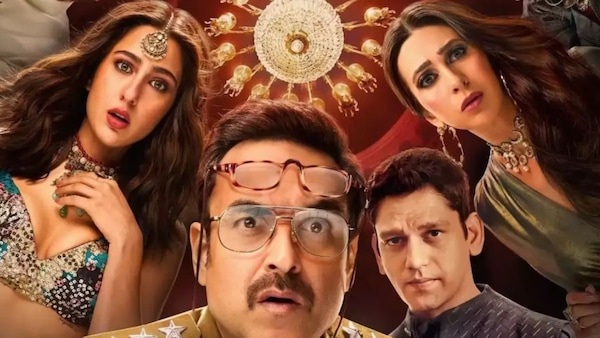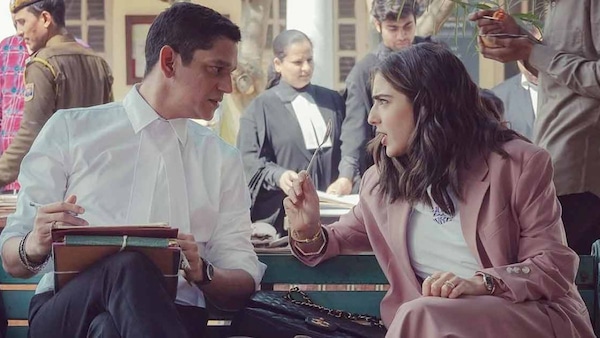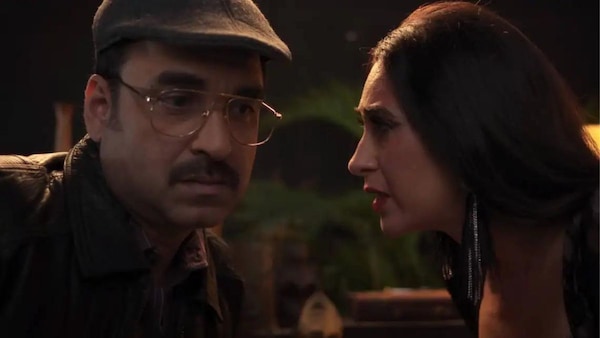Murder Mubarak Could Have Been A Fun Murder Mystery, But Crashes As A Bore Instead
Homi Adajania’s Murder Mubarak, his first feature film in four years, evokes a crippling brand of frustration as it unfolds.

Last Updated: 06.21 PM, Mar 16, 2024
SOME films reveal themselves early. A transcendental moment, a distinct gesture from an actor or a stray line can convince us about their merit beyond doubt. Conversely, some lose us with little effort. There also exists another kind, situated somewhere in the middle of these extremes, when everything falls into place initially — the jokes (if intended) land, the dialogues work, the twists intrigue — and then the filmmaker does something unimaginable. They watch all of it burn. Homi Adajania’s Murder Mubarak, his first feature film in four years, belongs to this category and evokes a crippling brand of frustration as it unfolds.
I cannot stress enough the enormity of the disappointment the film leaves behind precisely because of how effectively it dials up our expectations. Adajania, who had previously helmed the uneven series Saas, Bahu Aur Flamingo (2023), looks more assured than he has in a while. Even the premise is right up his alley. Adapted from Anuja Chauhan’s 2013 novel Club You To Death, an ostentatious murder mystery set in Delhi’s high society, Murder Mubarak promises to be a playground for the filmmaker famed for his oddball humour. For a while, things seem to be falling into place.
Little details work. A cat named Prince Harry in an elite club with a colonial hangover, a woman shaming another woman and then checking with her mother-in-law if she is wrong. A royal descendant handing out 20 bucks to waiters and insisting on being referred to as “hukum”, a middle-aged police officer suddenly turning on an accent when meeting an actress. Dimple Kapadia being Dimple Kapadia. The joys in Murder Mubarak are not scanty but they dry up soon.
When a gym instructor called Leo (Ashim Gulati) is found dead at a fancy club in Delhi, it signals the arrival of ACP Bhavani Singh (Pankaj Tripathi playing himself, yet again), a chaste Hindi-speaking police inspector who prefers wearing plain clothes. A little prodding opens up a Pandora's box and it turns out that Leo was blackmailing the members and extracting money to fund an orphanage he grew up in. On that list includes a famous actress called Shehnaz Noorani (Karisma Kapoor), a young widow named Bambi Todi (Sara Ali Khan), a drug addict (Suhail Nayyar) and his mother (a terrific Tisca Chopra), a lawyer from Kolkata called Aakash Dogra (Vijay Varma), a royal family member called Rannvijay Singh (Sanjay Kapoor) and Cookie Katoch (Kapadia), a rich woman whose affluence doubles up as her profession. Then there is the chairman of the club (an excellent Deven Bhojani).

Given that most of them had paid Leo money and that all of them are somehow tied to the other, makes everyone a suspect – a fact that does not escape Bhavani Singh’s attention. Adajania uses the setting to do his own version of eat-the-rich and The White Lotus. On paper, a city like Delhi which is stacked with visible inequality, makes for a perfect place for discriminatory examination. But the filmmaker envisions the space and the opulence in culture-agnostic hues that starkly contrast the clever and nuanced representation by makers like Zoya Akhtar and Reema Kagti in a show like Made In Heaven. The people in the film could have been anywhere and it would not have made a difference.
Certain lines bristle with wit. When Bhavani philosophically says that even the most experienced murderers undergo inner turmoil while committing the act, Tisca Chopra’s character hysterically adds, “The BMR must be going through the roof.” When it rains in November, she halts for a moment and says, “the poor farmers”. Even a random commentary on anti-national is included. But as the film unravels and more and more characters are pushed and pulled in different directions, words and critique both dissipate and Murder Mubarak reveals itself to be a self-congratulatory bore, too content being precocious when it could have been insightful.
The intent works. Adajania camouflages a love story as a murder mystery. The connection makes sense, given how innately themes like sacrifice, love and revenge are built into both genres. But it could be the sheer number of characters, which inevitably leads to none being well fleshed out or the uninspired casting that gives away the killer from a mile, Murder Mubarak works neither as a murder mystery nor a love story.

Singling one out might count as a spoiler but it is not difficult to discern given how little the film and some actors try. The outing struggles to engage during its runtime and when the moment of revelation arrives and the knots are untangled, the disclosure raises more questions and falls apart in closer examination. Turns out, there is nothing to congratulate ACP Bhavani Singh about.
